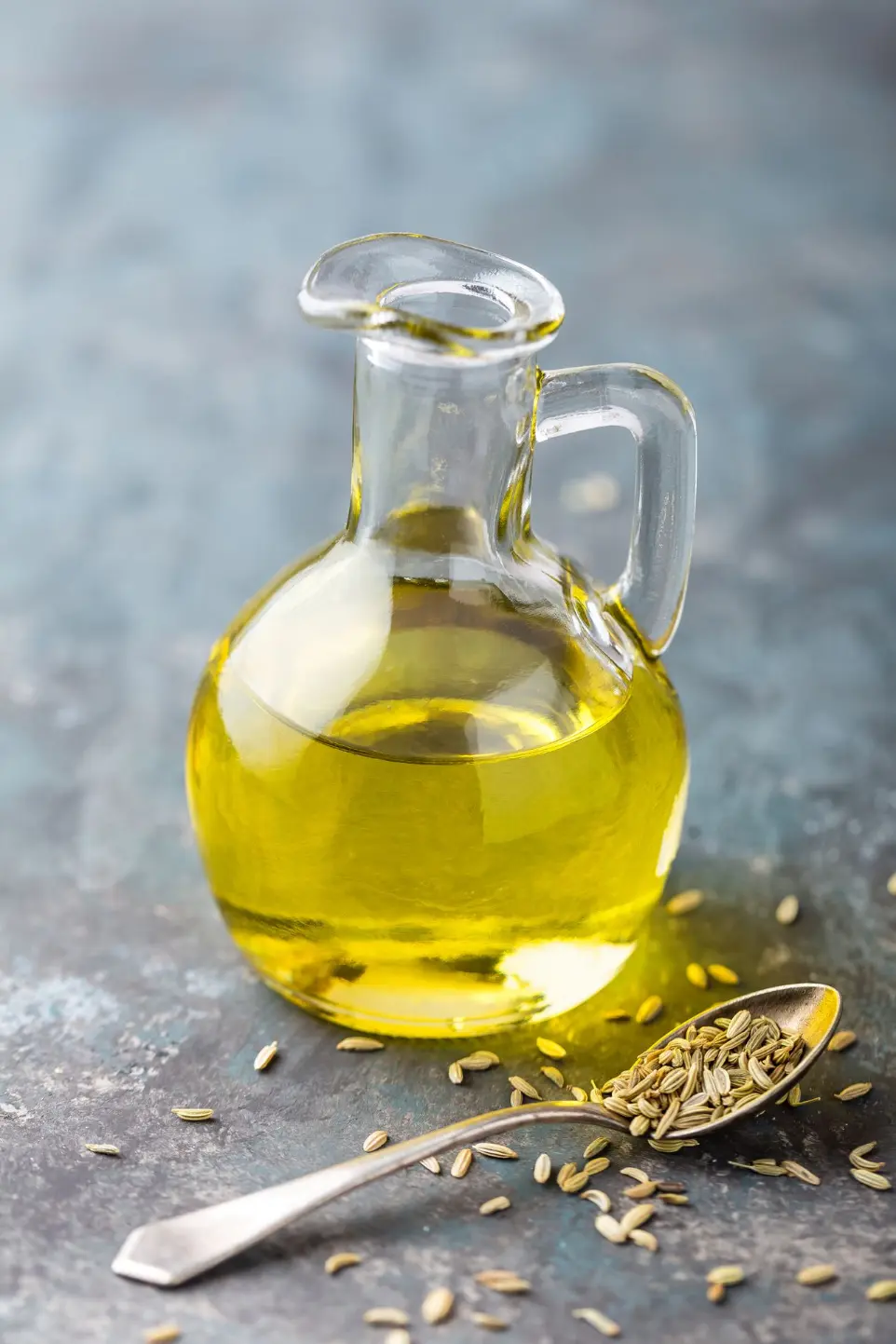About Product
Fennel oil is from the seeds of fennel. It is an aromatic spice that has a bittersweet taste. In India, it is commonly used to prepare tea for stomach troubles as well as mouth freshener which is chewed after meals. Fennel was part of the Nine Herbs Charm and five-spice mix first used in China. Even ancient civilizations used fennel due to the belief that it offered strength and courage.
Like star anise, fennel also contains anethole which gives it’s flavor. As a result, it gets confused with star anise but unlike star anise, fennels flavor tends to be more sweet and aromatic. Phellandrene, methyl chavicol, limonene, pinene , fenchone , fenchyl alcohol , anisaldehyde are some constituents of common fennel along with estragole and fenchone. Moreover, it has other phenolic compunds like flavonoids sterols.
Fennel is a potent aromatic spice and is used as a masking agent for odor in perfumery and disinfectant applications. It is also an aromatic insect repellant. As an ethnomedicine, it is traditionally utilized to remedy the common cold and digestive issues. In addition, fennel could be a natural antioxidant and contains anethole which makes it useful medically for being anticancer, carminative, laxative, antimicrobial.
Composition
- Anethole: The primary compound in fennel oil, responsible for its sweet, licorice-like aroma and many of its health benefits, including antimicrobial, anti-inflammatory, and digestive properties.
- Fenchone: A compound that contributes to fennel oil’s slightly bitter, herbal notes, and is believed to support digestive and respiratory health.
- Estragole: Known for its antioxidant and antimicrobial properties, estragole also contributes to the oil's sweet aroma.
- Limonene: A citrusy compound that provides additional antioxidant and anti-inflammatory benefits.
Physical Characteristics
- Appearance: Fennel oil is typically a pale yellow to greenish liquid.
- Odor: The fragrance is sweet, spicy, and licorice-like, with herbal undertones.
- Taste: Fennel oil has a sweet, slightly anise-like flavor, often used in small amounts to flavor dishes or beverages.
Health Benefits
- Digestive Support: Fennel oil is excellent for improving digestion. It can relieve indigestion, bloating, constipation, and nausea. It helps regulate the digestive system and promotes overall gut health.
- Antimicrobial Properties: Fennel oil’s anethole and estragole content give it strong antibacterial, antifungal, and antiviral properties, making it useful for treating infections and promoting a healthy immune system.
- Anti-inflammatory Effects: The oil’s anti-inflammatory properties help reduce inflammation, especially in conditions like arthritis, joint pain, and muscle soreness.
- Antioxidant Protection: Rich in antioxidants, fennel oil helps neutralize free radicals, reducing oxidative damage and promoting longevity and overall health.
- Respiratory Health: Fennel oil helps clear mucus from the lungs, ease symptoms of bronchitis, and promote healthy lung function. It also has expectorant properties that aid in relieving congestion.
- Hormonal Balance: Fennel oil is traditionally used to balance hormones, particularly in women. It can help regulate menstrual cycles and support lactation.
Fennel is very useful for digestion. Its tea is used to soothe stomach aches.
It acts as a mouth freshener.
Fennel has strong antioxidant properties.
Key Features
- Source: Derived from the seeds of the Pimpinella anisum plant (anise).
- Active Ingredients: Anethole, estragole, limonene, fenchone.
- Appearance: Clear to pale yellow liquid with a sweet, licorice-like fragrance.
- Applications: Used in culinary, skincare, hair care, wellness, and aromatherapy products.
- Health Benefits: Supports digestion, pain relief, antimicrobial protection, anti-inflammatory effects, respiratory health, and mood enhancement.
Application
Culinary Uses:
- Flavoring Agent: Anise oil is commonly used to flavor baked goods, candies, liqueurs (such as ouzo and absinthe), and savory dishes. It imparts a sweet, licorice-like taste, which makes it a popular addition to Mediterranean and Middle Eastern cuisine.
Cosmetics & Personal Care:
- Skin Care: Anise oil is used in skincare products for its antimicrobial properties, which help treat acne and other skin conditions. Its soothing qualities also make it beneficial for relieving skin irritation and inflammation.
- Hair Care: The oil is sometimes used in hair care products for its ability to promote scalp health, reduce dandruff, and stimulate hair growth.
- Massage Oil: Anise oil is used in massage blends for its ability to relieve muscle pain, cramps, and discomfort due to its anti-inflammatory and analgesic properties.
Health & Wellness:
- Digestive Health: Anise oil is commonly used to alleviate digestive issues like bloating, indigestion, and nausea. It is a traditional remedy for promoting digestion and relieving gas.
- Pain Relief: Anise oil has analgesic properties that make it effective for relieving headaches, muscle pain, and menstrual cramps. It is often used in topical formulations for this purpose.
- Respiratory Health: Anise oil can be used in steam inhalation or diffusers to help relieve coughs, bronchitis, and sinus congestion by loosening mucus and acting as a natural expectorant.
- Aromatherapy: In aromatherapy, anise oil is used for its calming and mood-lifting effects. It is commonly used to reduce stress, anxiety, and mental fatigue, while also helping to improve focus and concentration.
ALSO ACT AS A
- Flavoring Agent: used for flavoring savory dishes, sauces, tobacco products, meat and fish preparations, pickles, cookies, spice blends and other foods.
- Therapeutic: used in traditional medicine for pain relief and inflammation, aromatherapy treatments and as anti inflammatory herbal repellants
- Nutritional: active dietary supplements with antioxidants; aids digestion; supports weight loss; laxative herbal teas food preparations.

















